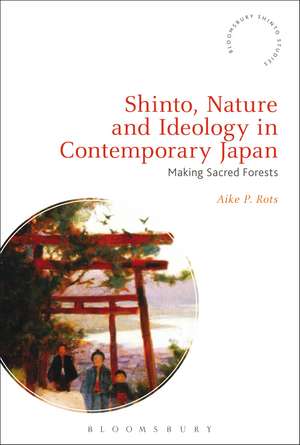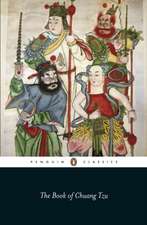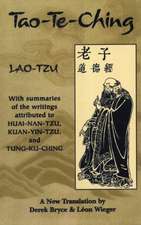Shinto, Nature and Ideology in Contemporary Japan: Making Sacred Forests: Bloomsbury Shinto Studies
Autor Aike P. Rotsen Limba Engleză Hardback – 6 sep 2017
| Toate formatele și edițiile | Preț | Express |
|---|---|---|
| Paperback (1) | 231.63 lei 6-8 săpt. | |
| Bloomsbury Publishing – 20 mar 2019 | 231.63 lei 6-8 săpt. | |
| Hardback (1) | 716.00 lei 6-8 săpt. | |
| Bloomsbury Publishing – 6 sep 2017 | 716.00 lei 6-8 săpt. |
Preț: 716.00 lei
Preț vechi: 1028.53 lei
-30% Nou
Puncte Express: 1074
Preț estimativ în valută:
137.05€ • 148.92$ • 115.20£
137.05€ • 148.92$ • 115.20£
Carte tipărită la comandă
Livrare economică 21 aprilie-05 mai
Preluare comenzi: 021 569.72.76
Specificații
ISBN-13: 9781474289931
ISBN-10: 1474289932
Pagini: 272
Ilustrații: 20 bw illus
Dimensiuni: 156 x 234 x 19 mm
Greutate: 0.56 kg
Editura: Bloomsbury Publishing
Colecția Bloomsbury Academic
Seria Bloomsbury Shinto Studies
Locul publicării:London, United Kingdom
ISBN-10: 1474289932
Pagini: 272
Ilustrații: 20 bw illus
Dimensiuni: 156 x 234 x 19 mm
Greutate: 0.56 kg
Editura: Bloomsbury Publishing
Colecția Bloomsbury Academic
Seria Bloomsbury Shinto Studies
Locul publicării:London, United Kingdom
Caracteristici
Challenges popular myths concerning Shinto's alleged love of nature, demonstrating that such notions are in fact modern ideological constructs which are used to depoliticize Shinto
Notă biografică
Aike P. Rots is Associate Professor of Contemporary Japanese Culture at the University of Oslo, Norway.
Cuprins
PrefaceList of figuresNote on style1. Introduction2. Defining Shinto3. Love of nature4. The Shinto environmentalist paradigm5. Chinju no mori6. Landscapes of the past7. Forests for the future8. Acorns for Tohoku9. Going green, going globalConclusionBibliographyIndex
Recenzii
A nuanced study that is historically informed while remaining timely ... Rots' prose is clear, his attention to detail, history, and nuance replete, and his interventions timely. Shinto, Nature and Ideology in Contemporary Japan is a trans-disciplinary work that sheds light on subject matter often mischaracterized by scholars without the proper background.
A significant and valuable contribution to the fields of religious studies, Japanese studies, Shinto studies, and Asian studies generally ... [It] provides the kind of thorough, fair, and at times sharply critical exposé of contentious issues pulsing through current shrine Shinto and Japanese nationalism.
Provides an insightful approach to understanding Shinto's discursive profile in contemporary Japan ... Effectively combining discourse analysis with ethnographic field work, Rots argues that Shinto has shed its strong association with prewar militarism by embracing conceptions of "nature" and "environmental sustainability."
[T]his book does full justice to its title and succeeds in presenting the first systematic and exhaustive study not only to discuss the Shinto environmentalist paradigm as an intellectual object but also to trace its concrete development in contemporary Japan. Through his focus on sacred shrine forests, Rots provides a finely nuanced portrait of the ecological discourses and practices produced by a wide range of individuals and organizations related to the Shinto world.
[W]ell researched, highly informative, and thought provoking.
A comprehensive overview . [Aike P. Rots] focuses not only on what these paradigms say but also what they leave out, and how they relate to actual practices and campaigns at the local and national levels. He is generous with his sources but pays attention to the distance between their rhetoric and reality.
The book does a great service for acknowledging religion's crucial role in our thinking and caring about the environment. Warmly recommended.
Shinto's latest iteration as a "green religion" is critically examined in this timely volume. Is the new environmental paradigm a rebranding strategy aimed at gaining legitimacy? Can Shinto activism expand beyond local preservation activities to engage national and global issues? How is it related to the imperial-ethnic paradigms, which define the Shinto establishment's neonationalistic political agenda? These questions and more are seriously engaged here.
In this illuminating book, Aike Rots critically analyses the much-vaunted image of Shinto as a 'nature religion' promoting environmentalism, showing that Shinto environmentalism is infused with themes of nationalism and full of ambiguities. As he demonstrates, Shinto 'sacred forests' that are depicted as manifestations of the natural world may be highly manufactured, while the shrines that promote them may take sponsorship from businesses involved in environmentally-damaging activities.
This well-researched analysis of the "Shinto environmentalist paradigm" centred on "sacred forests" (chinju no mori) makes an important and timely contribution to the study of religion in Japan and to current debates regarding Shinto ideology.
A significant and valuable contribution to the fields of religious studies, Japanese studies, Shinto studies, and Asian studies generally ... [It] provides the kind of thorough, fair, and at times sharply critical exposé of contentious issues pulsing through current shrine Shinto and Japanese nationalism.
Provides an insightful approach to understanding Shinto's discursive profile in contemporary Japan ... Effectively combining discourse analysis with ethnographic field work, Rots argues that Shinto has shed its strong association with prewar militarism by embracing conceptions of "nature" and "environmental sustainability."
[T]his book does full justice to its title and succeeds in presenting the first systematic and exhaustive study not only to discuss the Shinto environmentalist paradigm as an intellectual object but also to trace its concrete development in contemporary Japan. Through his focus on sacred shrine forests, Rots provides a finely nuanced portrait of the ecological discourses and practices produced by a wide range of individuals and organizations related to the Shinto world.
[W]ell researched, highly informative, and thought provoking.
A comprehensive overview . [Aike P. Rots] focuses not only on what these paradigms say but also what they leave out, and how they relate to actual practices and campaigns at the local and national levels. He is generous with his sources but pays attention to the distance between their rhetoric and reality.
The book does a great service for acknowledging religion's crucial role in our thinking and caring about the environment. Warmly recommended.
Shinto's latest iteration as a "green religion" is critically examined in this timely volume. Is the new environmental paradigm a rebranding strategy aimed at gaining legitimacy? Can Shinto activism expand beyond local preservation activities to engage national and global issues? How is it related to the imperial-ethnic paradigms, which define the Shinto establishment's neonationalistic political agenda? These questions and more are seriously engaged here.
In this illuminating book, Aike Rots critically analyses the much-vaunted image of Shinto as a 'nature religion' promoting environmentalism, showing that Shinto environmentalism is infused with themes of nationalism and full of ambiguities. As he demonstrates, Shinto 'sacred forests' that are depicted as manifestations of the natural world may be highly manufactured, while the shrines that promote them may take sponsorship from businesses involved in environmentally-damaging activities.
This well-researched analysis of the "Shinto environmentalist paradigm" centred on "sacred forests" (chinju no mori) makes an important and timely contribution to the study of religion in Japan and to current debates regarding Shinto ideology.






















